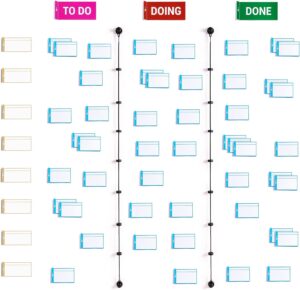Are you curious about how to develop your child’s executive functions in a way that promotes integrity, responsibility, and graciousness? This comprehensive guide delves into the core SCRUM principles that can greatly benefit your child’s executive functions, enabling them to navigate challenging situations with confidence and acceptance of others’ differences. Discover the secrets to helping your child thrive and grow into a well-rounded individual.
Introduction
Welcome to an informative article about the core SCRUM principles and how they can benefit children’s executive functions. In this article, we will explore the definition of SCRUM, discuss the importance of executive functions for children, and delve into the various benefits of applying SCRUM principles to enhance these functions. By the end of this article, you will have a clear understanding of how SCRUM principles can support children in developing important skills such as goal-setting, collaboration, time management, self-organization, adaptability, continuous learning, and efficient teamwork. So let’s dive in and discover the valuable lessons that SCRUM can offer to cultivate well-rounded individuals in our younger generation.
SCRUM Principles for Children’s Executive Functions
Definition of SCRUM
SCRUM, originally a project management methodology, has gained widespread recognition and utility across various domains, including software development, education, and personal development. This dynamic and flexible framework promotes effective teamwork, collaboration, and adaptability in achieving desired goals. Based on an iterative and incremental approach, SCRUM values transparency, inspection, and adaptation as its core principles. Applying SCRUM principles to children’s executive functions can offer a comprehensive framework for nurturing essential life skills, helping them grow into individuals who embody integrity, responsibility, graciousness, acceptance of others’ differences, and resilience during challenging times.
Importance of Executive Functions for Children
Before we delve into the core SCRUM principles, it is crucial to understand the significance of executive functions in a child’s development. Executive functions refer to a set of cognitive skills located in the prefrontal cortex of the brain. These functions include abilities such as goal-setting, problem-solving, impulse control, working memory, time management, task initiation, self-organization, and flexible thinking. Strong executive functions are vital for children’s academic success, social-emotional well-being, and overall ability to navigate various life situations effectively. By harnessing and nurturing these executive functions, children can develop critical skills that will support their growth and success in the future.
Benefits of Applying SCRUM Principles to Children’s Executive Functions
Now that we understand the significance of executive functions for children, let’s explore the benefits of applying SCRUM principles to foster and enhance these essential skills:

1. Clear Goals and Priorities
Setting Clear Goals
One of the core principles of SCRUM is setting clear goals. By teaching children to articulate their goals, both short-term and long-term, they develop clarity and focus. Encourage your child to write down their goals and regularly review them. Breaking down larger goals into smaller, more manageable tasks enables children to understand the necessary steps to achieve their objectives. This practice instils a sense of purpose, motivation, and a proactive mindset in children, empowering them to take ownership of their aspirations.
Prioritizing Tasks
In addition to setting clear goals, teaching children to prioritize tasks is crucial. Help your child understand the importance of identifying urgent and important tasks, and guide them in creating a prioritized to-do list. By cultivating the habit of prioritization, children acquire valuable time management skills and learn to allocate their energy and resources effectively. This ability to distinguish between tasks of varying importance and urgency ensures that they stay organized and focused, boosting their overall productivity and sense of accomplishment.
2. Collaboration and Communication
Importance of Collaboration
Effective collaboration is a fundamental aspect of SCRUM, and it holds equal importance in children’s executive functions. Encouraging children to work collaboratively with their peers fosters teamwork, empathy, and respect for different perspectives. Collaborative projects and group activities provide valuable opportunities for children to learn how to listen actively, contribute effectively, and compromise when necessary. These experiences help children develop strong interpersonal skills, enabling them to thrive in diverse social settings throughout their lives.
Enhancing Communication Skills
Clear and effective communication is a crucial skill in both SCRUM and children’s executive functions. Encourage your child to express their thoughts, ideas, and concerns openly and respectfully. Teach them active listening techniques to enhance their understanding of others’ perspectives. Effective communication skills empower children to articulate their needs, seek help when required, and work cohesively in a team setting. By nurturing these skills, children can express themselves confidently and build strong relationships with their peers, teachers, and future colleagues.
3. Iterative and Incremental Approach
Breaking Tasks into Smaller Chunks
SCRUM promotes breaking complex tasks into smaller, manageable chunks. Similarly, teaching children to approach their tasks in an iterative and incremental way enhances their executive functions. Help your child understand that tackling larger assignments or projects step by step is more manageable and less overwhelming. Breaking down tasks allows children to focus on specific aspects, stimulates their problem-solving abilities, and helps them develop a sense of accomplishment with each milestone achieved. Additionally, this approach cultivates resilience and adaptability, as children learn to adjust their plans based on feedback and changing circumstances.
Frequent Reviews and Adaptations
Alongside breaking tasks into smaller parts, frequent reviews and adaptations are vital aspects of SCRUM and children’s executive functions. Encourage your child to reflect on their progress, identify areas for improvement, and make necessary adjustments accordingly. This introspective practice develops self-awareness and self-regulation skills, enabling children to recognize their strengths and weaknesses. By fostering a growth mindset through iterative and incremental learning, children become resilient problem solvers who embrace challenges as opportunities for growth.
4. Time Management
Setting Deadlines
Time management is a crucial skill that SCRUM emphasizes, and it plays a significant role in children’s executive functions as well. Teach your child the importance of setting deadlines for tasks and projects, helping them develop organization and planning skills. By working within specific time constraints, children learn to prioritize tasks, distribute their efforts effectively, and avoid procrastination. This practice instils accountability and punctuality, ensuring that children complete their assignments and responsibilities on time, reducing stress and fostering a positive work ethic.
Estimating Time for Tasks
In addition to setting deadlines, teaching children how to estimate the time required for different tasks is essential. By estimating the time needed for specific activities, children learn to allocate their time wisely and avoid over-commitment. This skill enables children to avoid rushing through tasks or feeling overwhelmed by unrealistic expectations. By accurately estimating time, children can develop a realistic schedule, allowing for breaks, leisure activities, and a healthy work-life balance.

5. Self-Organization and Accountability
Taking Ownership of Tasks
Self-organization is a key principle of SCRUM and a vital skill for children’s executive functions. Encourage your child to take ownership of their tasks and responsibilities, fostering a sense of accountability. By doing so, children develop a proactive mindset and become self-directed learners. Taking ownership helps children understand the importance of following through on commitments, as well as the consequences of their actions. This practice lays the foundation for personal and professional responsibilities, helping children develop into reliable and conscientious individuals.
Organizing Workload
Another crucial aspect of self-organization is teaching children how to manage their workload effectively. Help your child develop strategies for organizing their tasks, such as using visual aids like calendars, planners, or digital tools. By assisting them in breaking down assignments into actionable steps and creating a schedule, children enhance their ability to manage multiple tasks simultaneously. Organizing their workload also promotes a sense of structure and reduces the likelihood of feeling overwhelmed. This skill equips children with the ability to handle complex tasks, meet deadlines, and excel in various academic and personal endeavours.
6. Adaptability and Flexibility
Dealing with Changes
Adaptability and flexibility are essential skills both in SCRUM and children’s executive functions. Teach your child to embrace change as a natural part of life and encourage them to develop a flexible mindset. Help them understand that unexpected circumstances and challenges can arise, necessitating adjustments in plans or approaches. By cultivating adaptability, children become more resilient, open-minded, and better prepared to face uncertainties. This skill empowers them to navigate change with confidence, turning potential obstacles into opportunities for growth and learning.
Adapting to New Situations
In addition to dealing with changes, encouraging children to adapt to new situations is crucial for their executive functions. Expose them to diverse environments, such as new hobbies, extracurricular activities, or social situations. These experiences help children develop the ability to learn and adapt quickly, foster curiosity, and strengthen their problem-solving skills. By embracing new situations, children become more comfortable stepping out of their comfort zones, broadening their horizons, and developing a well-rounded personality.
7. Continuous Learning and Improvement
Embracing a Growth Mindset
SCRUM promotes a culture of continuous learning and improvement, and this principle is equally valuable in children’s executive functions. Encourage your child to embrace a growth mindset – the belief that intelligence and abilities can be developed through dedication and effort. This mindset fosters a love for learning and enables children to view challenges as opportunities for growth. By emphasizing the journey rather than just the outcome, children become more resilient, curious, and motivated to learn from their mistakes. Cultivating a growth mindset supports executive functions by promoting perseverance, self-confidence, and a passion for self-improvement.
Reflecting on Performance
In addition to embracing a growth mindset, teaching children the importance of reflecting on their performance is essential for their executive functions. Encourage your child to evaluate their work, identify areas for improvement, and celebrate their achievements. Reflective practice enhances their self-awareness, promotes critical thinking, and helps them identify effective strategies for future tasks. By fostering a habit of reflection, children develop a proactive approach to self-improvement, enabling them to continually enhance their executive functions and achieve personal growth.
10. Efficient Teamwork and Leadership Skills
Promoting Collaboration within a Team
Efficient teamwork is a cornerstone of SCRUM, and it plays a significant role in developing children’s executive functions as well. Encourage your child to actively participate in team projects and collaborative activities. These experiences provide valuable opportunities for children to develop teamwork skills, such as effective communication, active listening, problem-solving, and conflict resolution. By working collaboratively, children learn to appreciate the strengths of others, understand the value of diverse perspectives, and develop empathy. These skills are essential for successful teamwork and leadership throughout their personal and professional lives.
Developing Leadership Qualities
While teamwork is crucial, it is equally important to develop leadership qualities in children’s executive functions. Encourage your child to take on leadership roles within their academic or extracurricular endeavours. By assuming leadership positions, children learn the significance of guiding and inspiring others, making informed decisions, and taking responsibility for outcomes. Leadership opportunities provide a platform for children to enhance their organizational, decision-making, and problem-solving skills. Developing leadership qualities empowers children to become future leaders who effectively influence and inspire positive change in their communities.
Conclusion
The core SCRUM principles offer valuable insights into developing children’s executive functions, fostering skills such as goal-setting, collaboration, time management, self-organization, adaptability, continuous learning, and efficient teamwork. By implementing these principles in their daily lives, children can cultivate important life skills that contribute to their personal and academic success. Empowering children with these essential skills prepares them to become well-rounded individuals who thrive in various situations and positively impact the world around them. So, embrace the core SCRUM principles and nurture your child’s executive functions, enabling them to embark on a path of growth, accomplishment, and resilience.





